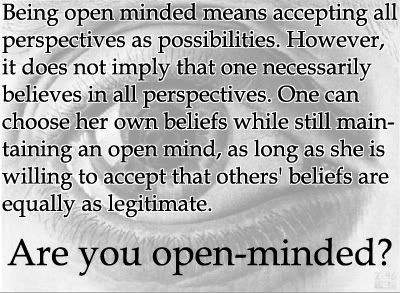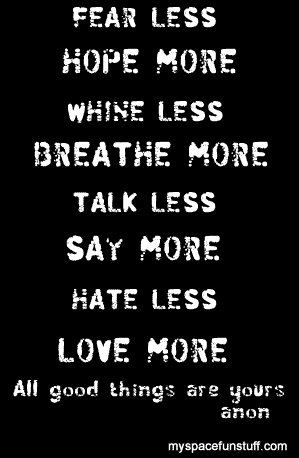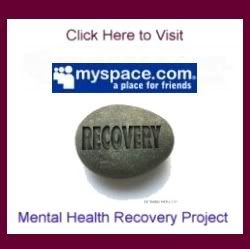First, I'll give you my story. I was 32 when I first considered counseling. I asked around and got the name of a woman who had a long-standing private practice. I trusted the people I asked, so I called to make an appointment. She said she could see me in a week.
Her office was in her home, which was located in "the sticks" (i.e. outside of the city limits, where there's trees and stuff.) The view from her office window was breathtaking and serene. The counseling session was not. I immediately had doubt as I sat in her long, narrow office. She sat at her desk on one side of the room....I sat way over on the other side where the proverbial client couch was located.
This gave me an opportunity to see every inch of the space between us...and I was reminded of my doctor's office - sterile, scrubbed, and devoid of everything except furniture, Kleenex, and a couple diplomas on the wall. The counselor's demeanor was also similar to my doctor's - willing to listen, but all-business and no smile. After that first session, I didn't go back.
By now, all of the "important" people in my life got wind of what I was up to...and they weren't happy. As a result, I started to hear messages from these people that I didn't "need" counseling, and that there was nothing "wrong" with me. You know how it is, if I would just relax, pull myself up by my bootstraps, and live the way they tell me to, I'll be okay. My response: Uh, alright, makes sense, I'll try it.
So for 6 more months, I pushed on, struggling to get better without any help. Yeah, it didn't work. So I decided to try again and I found another private practice in the phone book. A couple weeks later, I had my first appointment.
When I got to her office, I found it was in an old, Victorian-style house...next to a cemetery. A really big cemetery. Dead people as far as the eye can see. Hmm...okay. I wondered if it was some existential message: you have two choices - come into the house, or go lay down next to the dead people and wait for your headstone. I opted for the house.
The waiting room had mis-matched chairs, worn-out oriental rugs, toys all over the floor (they counseled all ages) and haphazardly-filled cases of books and magazines. When I got into the actual office, it was much of the same, but more tidy (except for the paperwork-littered desk in the corner.) The counselor gave me a big smile as she led me into her office, and sat in the chair right next to mine. I've been seeing her for 7 years now.
So what does this all say? Well, I'll tell you what is doesn't say. It doesn't say that the first counselor was bad. Remember, several people I knew had sought therapy from her and thought she was wonderful. Do I think these people were delusional? Nope. Not at all. If there's a large mass of people who are satisfied with a certain service provider, then that says a lot...but not everything.
This brings me to what I'm really saying here: only YOU can determine who is the right counselor for you. And on that note, only YOU can decide if you really need help at all. For many people, it's involves a two-part process that isn't linear. In other words, you don't do one part, move on to the second part, then arrive. Instead, each part needs to work together.
The first part of the process involves research and trial-and-error. Marsha Linehan, PhD. encourages clients to be "scientists" of life. Formal scientific research exists to make things "better." But in order to find a something truly "better," scientists can't take their first new idea and run with it. They need to research it and test it out before deciding it's a truly "better way." It takes awhile...and tt requires work.
I won't lie. If you use this approach with your mental health care, it can be frustrating. When we're in pain, we want quick relief. The mere thought of having to consider options and then test them out can be can quite discouraging. It's not easy to use every bit of energy to make a decision, only to find out you've made the wrong one. After all, if you try it again, who's to say that the next decision will be right?
Who's to say? YOU do.
This is where the second part of the process can be helpful. Believe it or not, you already have an endless source of information that is almost always right...your gut. No, not that thing you look down at once in a while and think: Gee, I need to do some sit-ups. Instead, it's that feeling you get every now-and-then that says you aren't comfortable with what's going on.
But it can be difficult to listen to this feeling. After all, it tends to have very bad timing. I mean, unless you're independently wealthy, you really don't need your pesky gut telling you that your job sucks. To immediately act on this gut feeling would leave you, well, homeless and hungry. Also, if your already emotionally stressed-out, the last thing you need is your gut shouting-out the obvious, so you find ways to stop listening.
What's helpful here is to view your gut as just another resource in your fact-finding mission. Listen to what it says, and add it to your research. Just like the other research you gather from outside sources, your "inner source" will eventually prove itself to be right or wrong (but most likely right.)
Use my story as an example of how this process works. My fact-finding produced the following information:
External sources
- Where to find counselors (the phone book, advice from friends.)
- I didn't need counseling (all those "important people" who, incidentally, aren't around here anymore.)
- I needed counseling.
- I wasn't comfortable with the first counselor.
- My second counselor's office being next to a bunch of dead people was slightly creepy.
- I'm comfortable with sloppy waiting rooms, a messy desks, and counselors who sit next to me and freely offer warm smiles.
In short, it was my gut that made the decision here. It was my gut who said: This is the kind of person I am, and this is the place I will go to for help. And since the process worked so well for me in the beginning, I've continued to use it in the following way:
- I've made good money on eBay selling the self-help books that I stopped reading halfway-through because what they said made me feel worse.
- I've increased, decreased, started, stopped and continued medications because I not only listened to my doctor, but also to how each medication really made me feel.
- And I have stuck with a counselor who gives me the choice at the end of each session to either schedule another appointment, or call when I'm ready.
I mention this because finding something that works isn't usually the end of it. As you grow and change, all of your systems will have to grow and change with you - including your use of the mental health system. For example:
- Your controlling family members probably won't be happy with your new-found assertiveness, and won't be afraid to let you know.
- You'll hear several mixed messages from the media, your doctor, family, friends, and your own body about the medications you're taking.
- Your co-workers might be put-off when you stop working overtime, or won't do all the mundane tasks they don't want to do either (which is why they pushed them on to you.)
- And possibly the hardest one of all - your counselor or doctor might not believe you're truly doing better, and are reluctant to let you go on without them.
This last one can be hard to understand. As a result, some tend to think it has to do with money and job security, which isn't usually the case (usually). Remember, if you continually sought help from these people, it's because you ultimately decided they were both trustworthy and effective. You established a relationship with them, and they are now a part of your life.
Also, these people are just that - people. They're bound to worry. After all, they met you when you weren't doing so well. And even if you've been seeing them an hour a week for 5 years, they still haven't had the chance to see how well you do the other 6 days and 23 hours of your life. They care about you. And to be honest, they also care about themselves because it's their entire career on the line if something goes wrong and your family sues them. It can be difficult, but if they've encouraged you to have a good life, try to respect that they want their own lives to be good as well.
So whether you're searching for mental health or want to maintain it, use your 2-part process...and use it, and use it. Listen to what others say, but don't necessarily believe it until your gut has a chance to weigh in. Sound decisions aren't usually made on the spot. Sometimes you get lucky and find the right therapist, medication, or self-help group on your first try. And sometimes you win the lottery. But in both money and mental health, these "lucky" people are very few in numbers. The rest of us have to keep working to get what we need.








